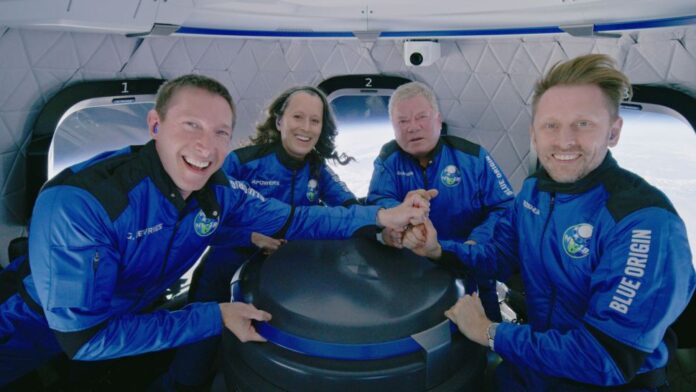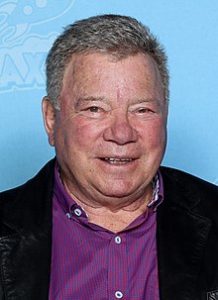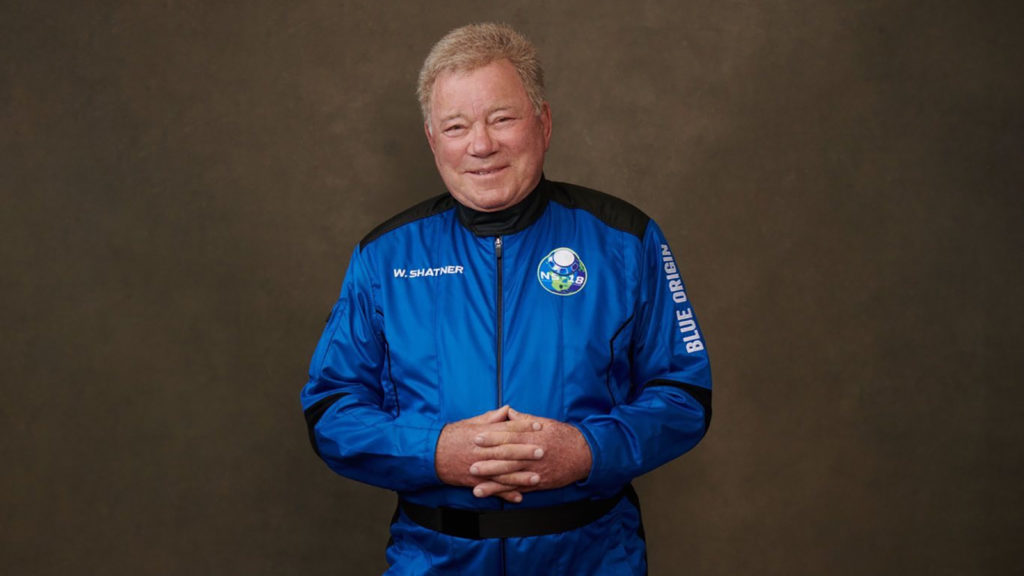
Captain Kirk traced his roots to Lithuania
For some reason it’s always exciting to find out that someone who is Lithuanian “made it big”. It sparks rumours, discussions and, of course, jokes, such as the one about Elvis Presley’s real name being Elvis Preslauskas. (It isn’t – the family lived in Mississipi and descended from Scots-Irish and German settlers).
 However William Shatner of Star Trek fame is Canadian by birth and Lithuanian-Jewish by parentage. His grandmother lived on Kapų street in Vilkaviškis. Online sources tell us that he was born in Cote Saint-Luc, Montreal, to Anne Garmaise and Joseph Shatner, a clothing manufacturer. His father was a Jewish emigrant from Bukovina in the Austro-Hungarian Empire, while his maternal grandparents were Lithuanian Jews. After he graduated from McGill University, he joined a local summer theatre group as an assistant manager, later performing with the National Repertory Theatre of Ottawa and at the Stratford, Ontario Shakespeare Festival as an understudy working with actors such as Alec Guinness, James Mason, and Anthony Quayle. He came to the attention of New York critics and was soon playing important roles on major shows on live television.
However William Shatner of Star Trek fame is Canadian by birth and Lithuanian-Jewish by parentage. His grandmother lived on Kapų street in Vilkaviškis. Online sources tell us that he was born in Cote Saint-Luc, Montreal, to Anne Garmaise and Joseph Shatner, a clothing manufacturer. His father was a Jewish emigrant from Bukovina in the Austro-Hungarian Empire, while his maternal grandparents were Lithuanian Jews. After he graduated from McGill University, he joined a local summer theatre group as an assistant manager, later performing with the National Repertory Theatre of Ottawa and at the Stratford, Ontario Shakespeare Festival as an understudy working with actors such as Alec Guinness, James Mason, and Anthony Quayle. He came to the attention of New York critics and was soon playing important roles on major shows on live television.
Shatner spent many years honing his craft before debuting alongside Yul Brynner in The Brothers Karamazov (1958). He was kept busy during the 1960s in films such as Judgment at Nuremberg (1961) and The Intruder (1962) and on television guest-starring in dozens of series such as Alfred Hitchcock Presents (1955), The Defenders (1961), The Outer Limits (1963) and The Twilight Zone (1959). In 1966, Shatner boarded the USS Enterprise for three seasons of Star Trek: The Original Series (1966). The series eventually became a cult classic with a worldwide fan base. The series ended in 1969, after which Shatner endured several years of hardship before reappearing in other films and TV series, commercials, Star Trek conventions and many televised events.
Shatner played the veteran police sergeant in T. J. Hooker (1982–1986) and hosted the reality-based television series Rescue 911 (1989–1996), which won a People’s Choice Award for Favorite New TV Dramatic Series. Shatner appeared in two episodes of the television detective series Columbo almost two decades apart.
After his final appearance as Kirk in Star Trek Generations (1994), Shatner continued his acting career. From 2004 until 2008, he starred as attorney Denny Crane both in the final season of the legal drama The Practice and in its spinoff series Boston Legal, a role that earned him two Emmy Awards, one on each series. He appeared in both seasons of the comical NBC real-life travelogue with other male companions “of a certain age” in Better Late Than Never, from 2016 to 2018. It was with this crew that he visited Lithuania, seraching for his roots.
He appeared in seasons 4 and 5 of the NBC series 3rd Rock from the Sun.
In 2011, McGill University awarded him an honorary Doctorate of Letters. Shatner was also awarded an honorary Doctor of Letters from New England Institute of Technology in May 2018.
Although Trekkies resurrected Star Trek after cancellation, in a 1986 Saturday Night Live sketch about a Star Trek convention, Shatner advised a room full of fans to “get a life”. The much-discussed sketch accurately portrayed his feelings about Trekkies, which the actor had previously discussed in interviews. Shatner was their unwilling subject of adoration for years; as early as April 1968, a group attempted to rip his clothes off as the actor left 30 Rockefeller Plaza.

Shatner has enjoyed success with a series of science fiction novels published under his name, though most are widely believed to have been written by uncredited co-writers such as William T. Quick and Ron Goulart. In May 1999, Simon & Schuster published Shatner’s book Get a Life!, which details his experiences with Star Trek fandom, anecdotes from Trek conventions, and his interviews with dedicated fans, in particular those who found deeper meaning in the franchise.
Shatner had invented his own idea about the beginning of Star Trek with his 2007 novel Star Trek: Academy – Collision Course. His autobiography Up Till Now: The Autobiography was released in 2008. He was assisted in writing it by David Fisher.
Shatner has a star on the Hollywood Walk of Fame (for television work) at 6901 Hollywood Boulevard. He also has a star on the Canada’s Walk of Fame. Shatner was the first Canadian actor to star in three successful television series on three different major networks (NBC, CBS, and ABC).
Shatner began his musical career with the spoken word 1968 album The Transformed Man, delivering exaggerated, interpretive recitations of popular songs like “Mr. Tambourine Man” and “Lucy in the Sky with Diamonds” paired with readings from famous plays. He subsequently released more albums, his seventh – The Blues, on October 2, 2020. The album peaked at No. 1 on the Billboard Blues Chart on October 17, 2020. In August, 2021, Shatner announced he would be releasing a new album, Bill. It was released on September 24.

The most recent headlines about Shatner came in October 2021, when he flew to space on a ten-minute flight aboard a Blue Origin sub-orbital capsule. At age 90 he became the oldest person to fly to space and one of the first 600 to do so. Minutes after the flight Shatner articulated experiencing the overview effect – the experience of seeing firsthand the reality of the Earth in space, which is immediately understood to be a tiny, fragile ball of life, “hanging in the void”, shielded and nourished by a paper-thin atmosphere.

Being moved to tears is a common experience described by astronauts, going all the way back to Alan Shepard, the first American astronaut in space. Shatner, upon his return to Earth, recounted the following message of gratitude, hope, and the profoundly deep emotions he was feeling.
“Everybody in the world needs to do this. Everybody in the world needs to see this. [It’s] unbelievable… To see the blue color rip by you and now you’re staring into blackness, that’s the thing… the covering of blue. This sheet, this blanket, this comforter of blue we have around us, we say ‘oh, that’s blue sky,’ and then suddenly you shoot through it all of a sudden, like you rip the sheet off of you when you’re asleep, and you’re looking into blackness, into black ugliness, and you look down and there’s the blue down there and the black up there … there is mother and Earth and comfort and there’s, is there death? I don’t know? Was that death? Is that the way death is? Whup! And it’s gone. It was so moving to me. This experience, it’s something unbelievable.”
Information from Wikipedia and other online sources



























